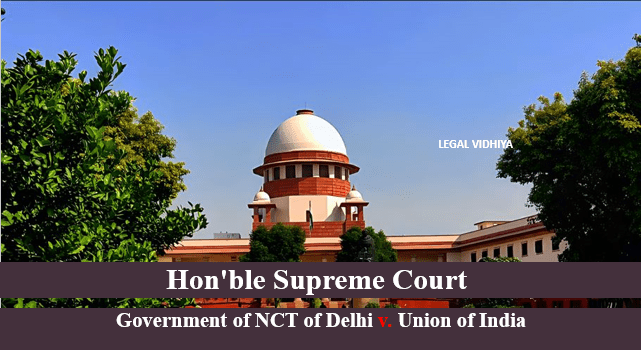
| Citation | 2023 INSC 517 |
| Date of Judgment | May 11, 2023 |
| Court | Supreme Court of India |
| Case Type | Civil Appeal No 2357 of 2017 |
| Appellant | Government of NCT of Delhi |
| Respondent | Union of India |
| Bench | Dr Dhananjaya Y Chandrachud, MR Shah, Krishna Murari, Hima Kohli, Pamidighantam Sri Narasimha |
| Referred | Article 239AA of Indian Constitution |
FACTS OF THE CASE
- Some writ petitions were filed before the Delhi High Court in which the seminal issue for consideration was the powers exercisable by the elected government of NCTD and manner of administration.
- Article 239 and 239-A of the Constitution, inter alia, make the provisions regarding administration of NCTD.
- The high court held that since NCTD remains a union territory, it is the president who continues to administer NCTD as well as territory of the union.
- The central government and his nominee, namely lieutenant governor enjoys the overlapping power.
- On appeals to the Supreme Court, the division bench found that the issue raised were of seminal constitutional importance and referred the matter to the constitution bench.
ISSUES
Who would have control over the services in the National Capital Territory of Delhi-The Government of NCTD or the Lieutenant Governor acting on behalf of the Union Government?
ARGUMENTS
On the behalf of appellant :-
- Appellant argued that The Legislative Assembly of NCTD has competence over entries in List II and List III except for the expressly excluded entries of List II.
- In addition to the Entries in List I, Parliament has legislative competence over all matters in List II and List III in relation to NCTD, including the entries which have been kept out of the legislative domain of NCTD by virtue of Article 239AA(3)(a)
On the behalf of the respondent :-
- Respondent argued that the executive power of NCTD is co-extensive with its legislative power, that is, it shall extend to all matters with respect to which it has the power to legislate. Thus, the legislative and executive power of NCTD extends to all subjects in Lists II and III, except those explicitly excluded.
- However, in view of Article 239-AA(3)(b), Parliament has the power to make laws with respect to all subjects in List II and III for NCTD
JUDGEMENT
- By virtue of article 239AA of Indian constitution NCTD is accorded a “sui generis” status and not considered the same as the other union territories.
- The Legislative Assembly of NCTD has competence over entries in List II and List III except for the expressly excluded entries of List II. In addition to the Entries in List I, Parliament has legislative competence over all matters in List II and List III in relation to NCTD, including the entries which have been kept out of the legislative domain of NCTD by virtue of Article 239AA(3)(a)
- The executive power of NCTD is co-extensive with its legislative power, that is, it shall extend to all matters with respect to which it has the power to legislate and The Union of India has executive power only over the three entries in List II over which NCTD does not have legislative competence.
- The executive power of NCTD with respect to entries in List II and List III shall be subject to the executive power expressly conferred upon the Union by the Constitution or by a law enacted by Parliament
- The phrase ‘insofar as any such matter is applicable to Union Territories’ in Article 239AA(3) cannot be read to further exclude the legislative power of NCTD over entries in the State List or Concurrent List, over and above those subjects which have been expressly excluded with reference to the phrase “Subject to the provisions of this Constitution” in Article 239AA(3), the legislative power of NCTD is to be guided, and not just limited, by the broader principles and provisions of the Constitution
- NCTD has legislative and executive power over “Services”, that is, Entry 41 of List II of the Seventh Schedule because: (I) The definition of State under Section 3(58) of the General Clauses Act 1897 applies to the term “State” in Part XIV of the Constitution. Thus, Part XIV is applicable to Union territories; and (II) The exercise of rule-making power under the proviso to Article 309 does not oust the legislative power of the appropriate authority to make laws over Entry 41 of the State List.
- The answer given by the constitutional bench is that the Registry shall place the papers of this appeal before the Regular Bench for disposal after obtaining the directions of the Chief Justice of India on the administrative side.
REFERENCES
This Article is written by Aman Maurya of Greater Noida College Of Law, Intern at Legal Vidhiya.




0 Comments